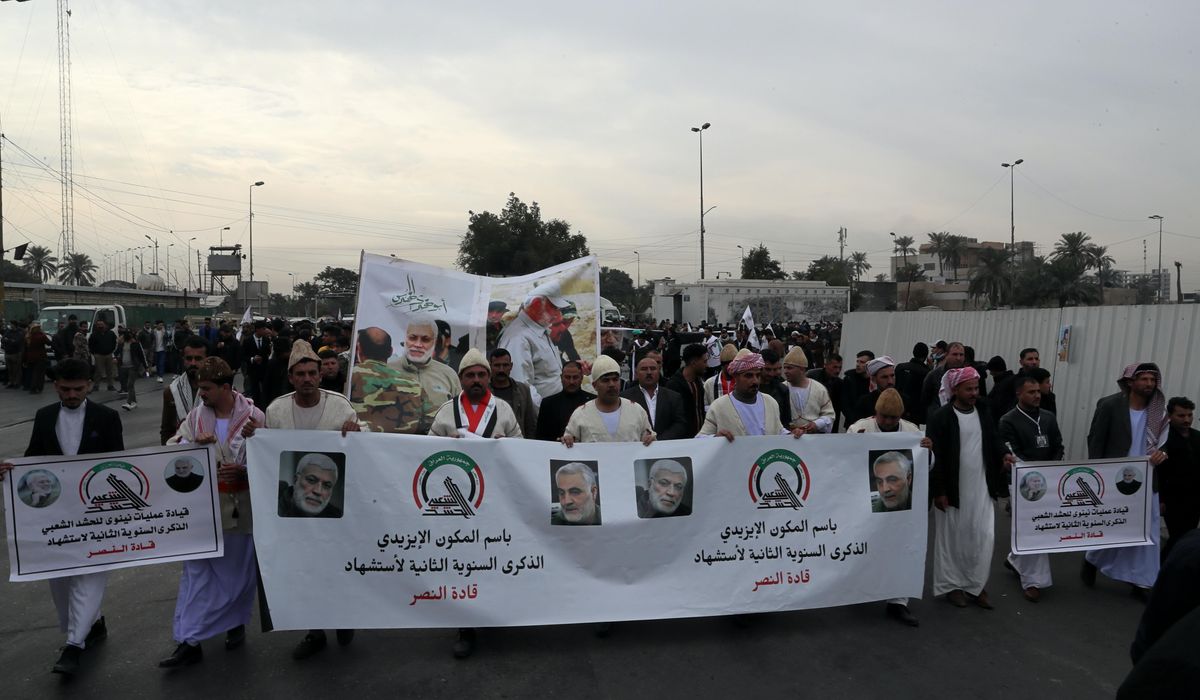
The nearly 2-decade-old U.S. military mission in Iraq has entered a dangerous new phase, with critics warning that the Biden administration has allowed it to carry on without clear parameters or a straightforward endgame and with increased attacks by volatile Iranian proxies.
President Biden, who oversaw the disastrously executed military pullout from Afghanistan last year, declared months ago that the U.S. combat role in Iraq would be over by the end of 2021.
Although American forces formally transitioned in December from a combat mission against Islamic State remnants to advising the Iraqi military, analysts say the roughly 2,500 U.S. troops still in Iraq face growing threats, specifically from Iran-backed militias.
The predominantly Shiite Muslim militias, several of which are backed directly by the Iranian military, have grown increasingly unpredictable and erratic in recent months while their political backers in Baghdad struggle to maintain power and influence within the Iraqi government.
During the first two weeks of the year, the militias launched at least four attacks on U.S. military or diplomatic installations, including a rocket attack Thursday that targeted the U.S. Embassy in Baghdad.
The most prominent of the Iraqi Shiite militias is Kata’ib Hezbollah. U.S. officials said the group launched regular drone and rocket assaults against American personnel throughout 2021.
Kata’ib Hezbollah attacks last summer prompted Mr. Biden to order retaliatory U.S. airstrikes at least twice on the militia’s facilities along the Iraq-Syria border.
Critics said the retaliatory strikes put troops in harm’s way with little strategic upside. They say the U.S. remains at war in Iraq and Syria and that the Biden administration is allowing American troops to be dragged deeper into a shadow conflict with Iran.
‘Teenage rebellion’
The risk to U.S. forces is likely to grow worse this year, some analysts say. They warn that the Shiite militias in Iraq are increasingly operating on their own volition regardless of what their Iranian backers may or may not want them to do.
Kata’ib Hezbollah and other groups could intensify assaults on Americans no matter what they are told by the theocratic regime in Tehran, which acts as their primary financial backer and military partner.
“Even the Iranians are a bit annoyed with them right now because they aren’t responsive to orders anymore. They’re starting to get very teenage rebellion — do whatever they feel like, even if the Iranians say, ‘Don’t kill an American by accident,’” said Michael Knights, a fellow at the Washington Institute for Near East Policy who closely tracks Iraqi politics and militias operating inside the country.
An even worse scenario could materialize if U.S.-Iranian negotiations aimed at securing a new deal to limit Tehran‘s nuclear program fall apart. In that instance, Tehran could abandon all restraint and give a full green light to its proxies, potentially setting off a wave of drone attacks, suicide bombings and other strikes aimed squarely at Americans.
“If the U.S.-Iran relationship goes very negative in 2022, the security situation for our troops will go negative as well,” said Mr. Knights. “They could use a new weapons system, something we haven’t seen before, something we wouldn’t be ready for. … All that’s holding them back from doing that is they know that if they kill us, we’ll hit them back.”
The security situation in Iraq has grown more combustible. In November, Iraqi Prime Minister Mustafa al-Kadhimi survived an attempted assassination via armed drone. The attack bore the hallmarks of tactics frequently employed by Kata’ib Hezbollah and other Iraqi Shiite militias.
Against that backdrop, the continued risk to U.S. troops is fueling debate at home about exactly what Washington can achieve with its presence in Iraq and neighboring Syria. In each country, the Biden administration’s stated mission for the Pentagon is to advise and train local security forces battling what is left of the once-mighty Islamic State terrorist organization.
Still, the administration has made it clear that the U.S. won’t hesitate to fight back, regardless of who is responsible, if the 2,500 American troops in Iraq and the nearly 1,000 in Syria are attacked.
U.S. forces “clearly are at risk in the region,” Pentagon spokesman John Kirby told reporters last week. “We always have the right of self-defense.”
White House National Security Adviser Jake Sullivan warned Tehran in a Jan. 9 statement that the U.S. would rally quickly if Iranian proxies kill any of its service members.
“As Americans, we have our disagreements on politics. … But we are united in our resolve against threats and provocations,” Mr. Sullivan said. “We are united in the defense of our people. We will work with our allies and partners to deter and respond to any attacks carried out by Iran.”
Tensions between the U.S. and Iran have been high since President Trump withdrew from the Iran nuclear deal in 2018. They spiked in January 2020 when a U.S. airstrike killed top Iranian Quds Force Gen. Qassem Soleimani while he was visiting Baghdad with the commander of Kata’ib Hezbollah, who was also killed by the strike.
Changing dynamics
The Pentagon and White House have given no indication that the U.S. aims to fully withdraw its forces from either Iraq or Syria, drawing a clear distinction from the total American pullout from Afghanistan.
Many analysts say U.S. troops will likely stay in Iraq and Syria for years to come to work closely with Iraqi security forces and Kurdish allies, such as the Syrian Democratic Forces, to prevent a resurgence of the Islamic State, a Sunni Muslim extremist group.
Critics say the stated mission masks Washington’s true aim: to limit Iranian influence in the region, particularly in Iraq. They say it’s foolish to put American men and women in danger to prop up an Iraqi government and military that otherwise could collapse and quickly come under near-total Iranian control.
“Iranian influence has been steadily growing since our invasion [in 2003]. We were not able to check or roll back Iranian influence when we had 150,000 troops during the surge in the mid-2000s, and we’re not going to be able to do it with a few thousand troops,” said Dan Caldwell, a Marine veteran of the Iraq War who is now vice president of foreign policy at Stand Together.
The nonprofit organization partners with numerous conservative outfits, including Americans for Prosperity and the Charles Koch Institute.
Mr. Caldwell said it’s long past time for all U.S. troops to exit Iraq and Syria and that the fight against Iranian influence has already been lost.
“In essence, Iran won this battle when we overthrew Saddam Hussein,” he said. “Iran is Iraq‘s neighbor. They are heavily embedded within the Iraqi security forces. … Unless we are willing to install another Sunni Baathist strongman in Baghdad, I don’t see an opportunity to significantly roll back Iranian influence in Iraq.”
Mr. Caldwell and others who argue that the U.S. should withdraw fully from Iraq say training and equipping Iraqi security forces are in some ways aiding the very groups that target Americans.
Indeed, Kata’ib Hezbollah and other Iran-backed outfits in Iraq are part of the Popular Mobilization Forces (PMF), an umbrella organization that is an official part of the Iraqi military.
The PMF played a major role in the U.S.-led effort to defeat the Islamic State group and crush the “caliphate” it established in Iraq and Syria last decade.
However, links between the Iranian government and the PMF are clear.
The January 2020 U.S. airstrike that killed Soleimani also killed Abu Mahdi al-Muhandis. In addition to commanding Kata’ib Hezbollah, al-Muhandis was deputy head of the PMF. Soleimani and al-Muhandis were traveling in the same vehicle near Baghdad‘s main airport when the U.S. struck.
Although the Iran-PMF links still exist, some analysts say, Tehran‘s direct control over its proxy militias has weakened.
Mr. Knights, the Washington Institute fellow, said Tehran wants the militias to do little beyond “cosmetic” attacks. Part of the reason is that Iran doesn’t want an all-out conflict with the U.S. and that Iranian leaders still hope to extract sanctions relief and other concessions from America and in ongoing nuclear talks.
Mr. Knights said the Pentagon is exceedingly careful about its train-and-assist mission with the Iraqi security forces and that no American assistance flows to any militias that might target American forces.
At the same time, the political base of Kata’ib Hezbollah and associated groups in Iraq has begun to crumble.
In this fall’s Iraqi parliamentary elections, the Fatah Alliance, a political group with ties to the Iran-backed militias, lost 28 of its 48 seats. The losses mean the militias have far less political support than in years past, although it’s unclear what the new political dynamics will mean for U.S. troops and their security.
“I have never seen Iraq‘s body politic so willing to take risks pushing back on militias,” said Mr. Knights. “I’ve never seen the militias as isolated as they are now. … In Iraq, the enemy is not in the ascendant. It is relapsing in power.”








